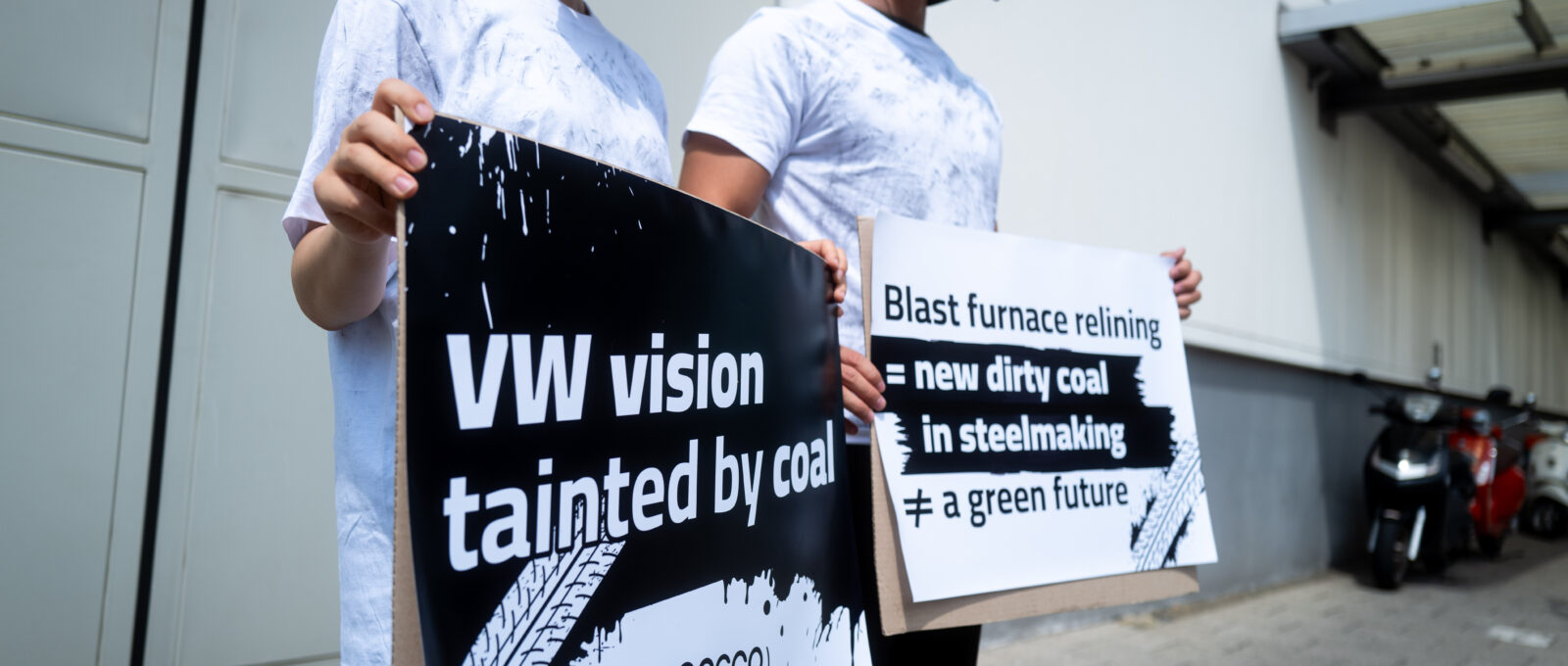The term ‘green steel’ gets thrown around a lot lately – but what qualifies as truly green steel?
Investors and policymakers have an essential role to play in determining what is green steel and what is greenwashing of conventional steel production. It will be up to investors to decide which decarbonization strategies are worth investing in, and which companies are leading the market on steel decarbonization. And it will be up to policymakers and regulators to decide which types of steel production should be eligible for public subsidies and tax credits.
A new survey of investors from the Australasian Centre for Corporate Responsibility (ACCR) shed some light on this question, finding that 81% of investors agree that ‘green steel’ cannot be produced with fossil fuels.
This might seem obvious, but steelmakers have already been caught out trying to greenwash their conventional steel production as sustainable. POSCO has been called out for greenwashing by Solutions for Our Climate, for example, because they characterize products made in coal-fired blast furnaces as ‘green steel.’
POSCO is also under fire for plans to reline coal-fired blast furnaces, prolonging the life of polluting, coal-intensive steelmaking infrastructure. This is in direct conflict with investor expectations, according to the ACCR survey. The majority of investors surveyed (68%) foresee a transition away from metallurgical coal in steelmaking.
Nissan and Toyota have also made claims about using ‘green steel’ in their cars, despite the fact that the steel in question is still produced with coal-fired blast furnaces. This new survey shows that investors can see right through these claims, and want to invest in companies using truly fossil-free green steel.
Automakers don’t need to take on the reputational risk that comes along with making false claims about the sustainability of their supply chains. Truly green steel is becoming more affordable every day, and automakers can play an important role in bringing costs down by investing in the infrastructure needed to create a fossil-free global steel industry.
A recent report on green steel economics from Transition Asia, Solutions for Our Climate and Global Efficiency Intelligence found that green H2-DRI steelmaking will soon be cost-competitive with traditional primary steelmaking, as the cost of producing green H2 is expected to significantly decrease by 2030. Even today, building cars with green steel adds only 1% to the cost of production.
Another recent report from Transport and Environment put the cost of transitioning to 40% green steel at just €57 per electric vehicle in 2030. By 20240 using 100% green steel will cost only €8 per vehicle compared to using conventional steel, due to carbon pricing policies and the falling costs of green steel production.
The International Council on Clean Transportation (ICCT) came to similar conclusions in their recent report, ‘Technologies to reduce greenhouse gas emissions from automotive steel.’ They found that automakers can eliminate more than 95% of greenhouse gas emissions from producing steel for passenger vehicles by switching to fossil fuel-free steel. Doing so would reduce overall vehicle manufacturing emissions by up to 27%.
As in other studies, the ICCT concluded that using fossil fuel-free steel in vehicle production increases cost by only $100–$200, less than 1% of the price of an average new vehicle. Leading experts across the world arrive at the same estimate of the cost of using green steel in auto production – $100-200 dollars per vehicle or 1% of the cost of production.
The debate is settled: green steel in auto production is already affordable enough that many consumers would gladly accept a 1% green premium on an electric vehicle in exchange for the knowledge that their vehicle is made from fossil-free steel. One recent study from McKinsey of consumer preferences in food and beverage sales found that companies making ESG (environmental, social and governance) claims about their products experienced significantly greater growth than similar companies, demonstrating that consumers are willing to spend more for environmentally-friendly products – particularly relatively affluent and environmentally-conscious consumers in the market for an electric car.
To achieve the huge emissions reductions that are possible from decarbonizing the global steel supply chain, we must invest in green steel infrastructure to bring down costs even further. Automakers are perfectly positioned to do just that as some of the largest buyers of steel in the world.
Automakers can support the decarbonization of the steel industry by undertaking equity investments, joint ventures, offtake agreements and other contractual agreements with suppliers to catalyze investment in and production of green steel. They can also set publicly disclosed targets to increase the quantity of fossil-free steel used in their production cycles and disclose progress towards these targets. Many automakers, including Mercedes and Volvo have already joined demand-side multi stakeholder initiatives such as Steel Zero, Responsible Steel and the First Movers Coalition, which help to unlock investment in fossil-free steel by creating confidence in the scale of future markets.
Automakers should also support the increase in scrap-based steel production by setting targets to increase the amount of scrap steel in their production cycles, disclosing their progress towards achieving these targets, and developing closed loop processes to improve the recyclability of steel. They should also implement stringent environmental and human rights due diligence requirements for their steel suppliers to ensure that, from mining to manufacturing, the steel used in their vehicles does not cause other negative environmental and human rights impacts.
The transition to fossil-free steel is an opportunity for automakers to distinguish themselves as leaders on climate at little cost. Investors, especially climate-aware investors, are watching closely to see how automakers will respond.
